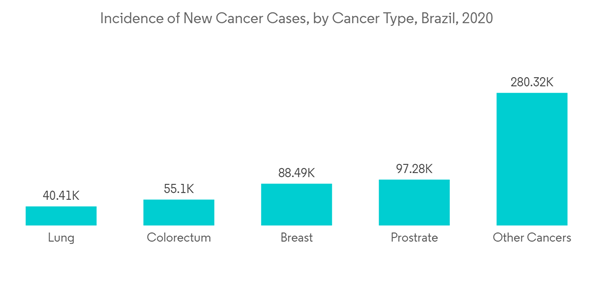The pandemic had an adverse effect on the country. Cancer patients were particularly affected by these activities since the length of time needed for screens, diagnoses, and treatment beginning had a negative impact on outcomes. Additionally, it was stated by the Brazilian National Health Agency (Agência Nacional de Sade - ANS) that non-urgent procedures, examinations, and visits will be postponed in 2020. In Brazil as a whole, screening services are significantly impacted by this. The national government of Brazil responded to COVID-19 by declaring a state of emergency due to the rise in cases, but the lockdown was implemented state-by-state, according to the research report "COVID-19: maintaining essential rehabilitation services across the care continuum" published in BMJ Global Health in May 2020. As a result, healthcare facilities all over Brazil provided inconsistent services. All outpatient facilities and services were shut down entirely in several states.
Numerous research studies have been released to offer light on the pandemic's effects. For instance, computed tomography (CT) was used to assess COVID in the nation, according to a research report published in July 2020 with the title "Computed tomography findings in a Brazilian cohort of 48 patients with pneumonia owing to coronavirus disease." Similar to this, a study with the title "Clinical usefulness of tomographic standards for COVID-19 pneumonia diagnosis: Experience from a Brazilian reference centre" was published in October 2020 at the Universidade Federal do Rio Grande do Sul, Program in Pneumology Sciences, Porto Alegre, RS, Brazil. In the early stages of the Brazilian COVID-19 outbreak, the study assessed the sensitivity, specificity, accuracy, and reproducibility of chest CT standards. A 16-slice CT was used for the chest CT, and patients were placed in the supine position during end-inspiration without receiving any contrast agent. Therefore, these studies would help the market grow. Thus, the market is expected to grow in the future.
Brazilian chronic disease occurrences, particularly those linked to neurological disorders and other chronic diseases, are a major driver of the computed tomography market. The growing research and development activity in the nation also influences its market. Parkinson's disease patients had an average age of 64.51 9.20 years, according to a study titled "Parkinson Anxiety Scale: A Validation Study for the Brazilian Population" published in 2020. This condition clearly illustrates that the rise in the geriatric population will lead to an increase in Parkinson's cases, and as a result, the studied market is anticipated to grow over the forecast period. Additionally, nearly 16% of all radiologists reported that CT imaging was their primary imaging technique, per a study titled "Estimating the productivity of radiologists in Brazil: the search for a benchmark," which was published in April 2020. This suggests that CT-related diagnostic techniques are becoming more prevalent across the nation. Collaboration is another key factor in market growth. In order to assess the safety, tolerability, and effectiveness of intranasal Foralumab in hospitalised patients with severe COVID-19 and pulmonary inflammation, Tiziana Life Sciences plc and FHI Clinical will perform a Phase 2 proof-of-concept trial in Brazil in September 2021. Following 14 days of intranasal delivery, the trial will assess the impact of foralumab on the remission of symptoms by chest computed tomography, inflammatory biomarkers, T-cell subpopulations, safety, and mucosal inflammatory response. Therefore, throughout the projection period, market expansion would be driven by the country's growing use of CT scanners in research and development. Thus, due to abovementioned factors the market is expected to grow in the future.
However, the lack of proper reimbursement and stringent regulatory approval procedures, and the high cost of equipment and CT scan procedures, are expected to hinder the market growth.
Brazil Computed Tomography Market Trends
Oncology Segment is Expected to Hold a Significant Market Share Over the Forecast Period
Some of the factors influencing this market's expansion in Brazil include the increasing prevalence of cancer illnesses and studies on the use of computed tomography to diagnose cancer cases. According to Globocan 2020, Brazil had 592,212 new cancer cases in 2020 and this number is expected to increase to 994,823 cancer cases by 2040. The country's use of CT scanners, which are used to diagnose many types of cancer, would be influenced by the anticipated increase in cancer cases. As a result, it is anticipated that the market under study will expand significantly during the next years. Many research studies are also taking place in Brazil that involves the use of computed tomography for cancer diagnosis. For instance, Arie Carneiro et al. and others published an article in the JCO Global Oncology Journal in April 2021 with the title "Consensus on Screening, Diagnosis, and Staging Tools for Prostate Cancer in Developing Countries: A Report From the First Prostate Cancer Consensus Conference for Developing Countries (PCCCDC)". According to the Brazilian researchers, their document will be used as a guide when performing CT scans for the diagnosis of prostate cancer because there are currently no guidelines for the screening, diagnosis, and staging of the disease in developing nations.Hence, the above factors and research studies are further expected to improve the market growth in this segment.
Brazil Computed Tomography Industry Overview
Brazil computed tomography market is moderately competitive and consists of several major players. Some of the companies that are currently dominating the market are Carestream Health, Dentsply Sirona, GE Healthcare, Planmeca Group (Planmed OY), and Koninklijke Philips NV among others.Additional Benefits:
- The market estimate (ME) sheet in Excel format
- 3 months of analyst support
This product will be delivered within 2 business days.









